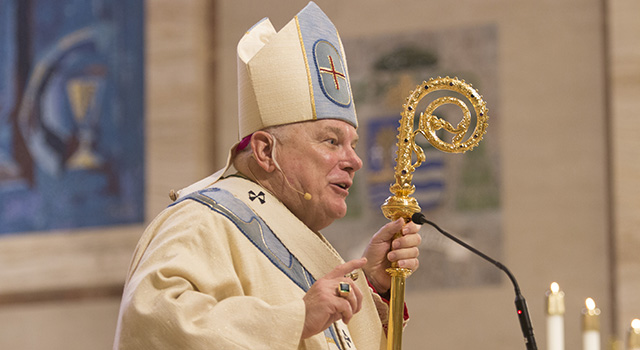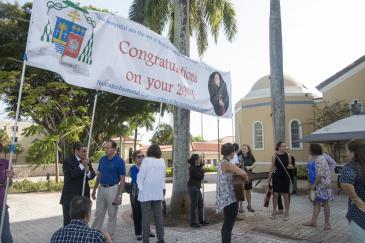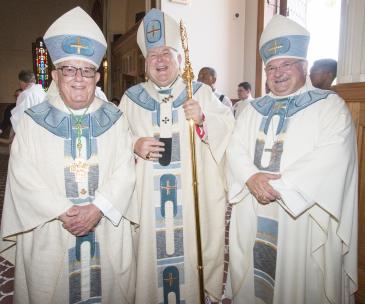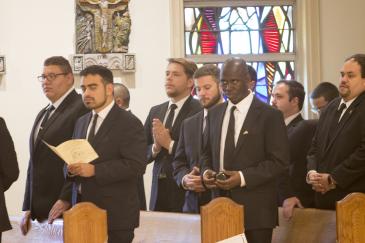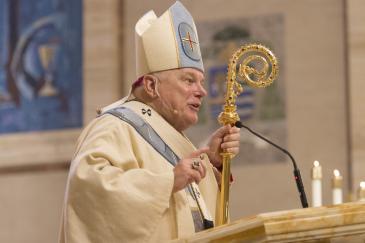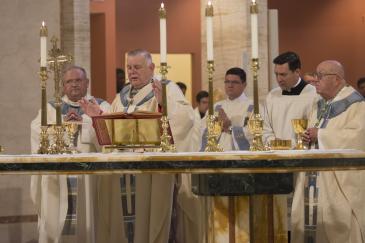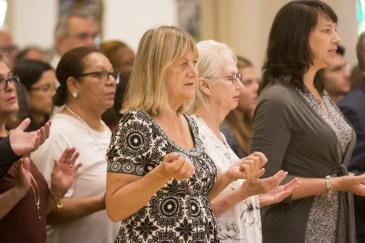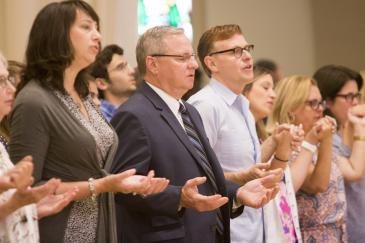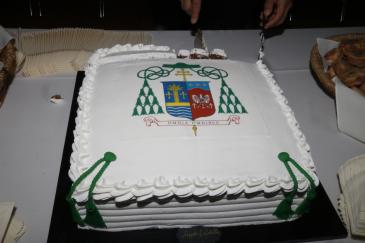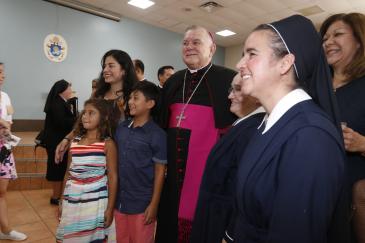By Archbishop Thomas Wenski - The Archdiocese of Miami
Photography: ANA RODRIGUEZ-SOTO | FC
Archbishop Thomas Wenski preached this homily during a Mass at St. Mary Cathedral on Sept. 3, 2017, the 20th anniversary of his ordination as a bishop.
Today, September 3rd, marks the 20th anniversary of my ordination to the episcopate. It seems like yesterday when Archbishop Favalora � and his co-consecrators, Archbishop McCarthy and Bishop Roman � ordained me and Bishop Gilberto Fernandez in the Miami Arena in the presence of some 11,000 people. I thank the Archbishop Favalora for being here today at this Mass of Thanksgiving. Also, present here today is my sister, Mary. I thank all of you who have come from other parishes to join with the parishioners of the Cathedral for this Mass.
A few days before I was ordained, Princess Diana was killed in a tragic accident, and a few days after my ordination Mother Teresa went home to God. And today, even as I pray thanking God for these twenty years, first as an auxiliary bishop here in Miami for six years, then as Bishop of Orlando for seven years, and now seven years as the fourth Archbishop of Miami, our hearts also turn in prayer for our brothers and sisters in Texas and Louisiana who are dealing with the aftermath of hurricane Harvey. Our second collection this morning will be taken up to help to relieve their suffering.
September 3rd also has special significance to my family: It was on that day in 1947 that my parents were married. Had they still been alive, my ordination as a bishop would have fallen on their 50th wedding anniversary. I can only thank God for them � and for the Catholic faith they handed on to me.
September 3rd is also the feast day of a holy Pope and doctor of the Church: St. Gregory the Great (540-604 AD). Born in Rome, Gregory lived in times no less challenging than our own, yet he proved to be a true shepherd by carrying out his office, helping the poor, spreading and strengthening the faith. His example and witness inspire bishops even with today’s challenges to approach the great responsibilities placed on us with certain equanimity.
Pope Saint John Paul II wrote in Pastores Gregis: “Spiritual realism enables us to see that the Bishop is called to live out his vocation to holiness in a context of difficulties within and without, amid his own weaknesses and those of others, in daily contingencies and personal and institutional problems. This is a constant feature of the life of pastors, as St. Gregory the Great acknowledged when he admitted with regret: ‘After having laid upon my heart the burden of the pastoral office, my spirit has become incapable of frequent recollection, because it remains divided among many things. I am obliged to judge the cases of churches and monasteries; often I am called to involve myself in the lives and actions of individuals ... And so with my mind pulled and torn, forced to think of so many things, when can it recollect itself and concentrate totally on preaching, without withdrawing from the ministry of proclaiming the word? ... The life of the watchman must always be on high and on guard’.”(#23)
I think every bishop � and indeed every pastor of souls � can easily identify with Pope Gregory and how the demands of his office weighed heavily upon him. And the words of Jesus in today’s Gospel are not to be taken lightly: “For the Son of Man will come with his angels in his Father's glory, and then he will repay all according to his conduct."
St. Paul tells us in the second reading, “Do not conform yourselves to this age” but to offer ourselves as a living sacrifice, holy and pleasing to God. Jesus’ words in today’s Gospel challenge us all. "Whoever wishes to come after me must deny himself, take up his cross, and follow me. For whoever wishes to save his life will lose it, but whoever loses his life for my sake will find it.”
God does not call necessarily the wisest, or the strongest or the most qualified. He often chooses those held to be weak in the eyes of this world so as to astound the strong. But he demands a wholehearted � and not merely a half-hearted � response. “Whoever does not carry his own cross and come after me cannot be my disciple.”
To celebrate 20 years of service as a bishop is certainly an opportunity � one that should not be passed up � to thank God who called me in spite of my unworthiness and to thank all of you, the Catholic people entrusted to my care, for your continued support of my ministry, for all that you do with me in promoting the gospel of Jesus Christ and especially for your prayers.
They say that it can be “lonely at the top” � people in leadership often are the target of hostility and unrealistic judgments � and the life of a bishop in spite of busy schedules and activities can sometimes seem lonely. Yet, like Pope St. Gregory the Great and others who have served as successors of the Apostles, a bishop is never alone as he seeks to respond to his vocation to be a “servant of the gospel of Jesus Christ for the hope of the world.” Our friendship with the Lord, nurtured in prayer, must always sustain us and strengthen us as do the prayers of our faithful and our priests. And every day, the priests and people of this local Church pray at every Mass “for Francis, our Pope, and Thomas, our bishop.”
And as I reflect on my 20 years as a bishop � and now 41 years as a priest � I become ever more keenly conscious of the fact of how your prayers and your collaboration have made it possible for the Lord to work through me � often times in spite of myself � to teach, lead and sanctify that portion of the Lord’s flock entrusted to me. To celebrate 20 years is also a time for some introspection, for a frank and somewhat painful examination of conscience and to ask God’s forgiveness for my sins and my failures as a Christian and as a bishop. May the Lord sustain me � with the help of your prayers � that I might always give myself wholeheartedly � and never half-heartedly � to his service.
There’s the story about a bishop � let’s say his name is John (this bishop was not John Favalora) but anyway this bishop one day called in one of his priests for correction because of a bit of liturgical innovation.
It seems that the good priest, instead of simply praying in the Mass “for our Pope, Francis, for our Bishop John,” he was taking some liberties with the formula by saying “for our Pope Francis and for our Bishop John, your unworthy servant.”
“Father,” the bishop said, “You’ve got to stop doing this.” The priest said, “What’s the problem, you say it.” The problem is, the bishop replied, “When you say it you mean it.”
But let me tell you, I don’t forget that I am indeed an “unworthy servant” � and when I do, a letter will usually arrive at my office from someone or another who is upset with me for something I wrote in the paper or with some decision I made, and they will tell me in so many words how unworthy a servant I am.
The only consolation for me � and for anyone of us � bishop or priests � who carry this great treasure of our priesthood in vessels of clay is to remember that each one of us � reaching back to Peter and the apostles � stands in a long line of “unworthy servants.” Hopefully we may always remain conscious that we are “unworthy servants” because in this way we can also learn how to be “humble servants.”
Pope Benedict wrote in Deus Caritas Est: “In all humility we will do what we can, and in all humility we will entrust the rest to the Lord. It is God who governs the world, not we. We offer him our service only to the extent that we can, and for as long as he grants us the strength. To do all we can with what strength we have, however, is the task which keeps the good servant of Jesus Christ always at work: ‘The love of Christ urges us on’ (2 Cor 5: 14) (#35Deus Caritas Est).
My episcopal motto is Omnia Omnibus � All things to all people. Here, in multicultural and multilingual South Florida, we must imitate this apostolic zeal of St. Paul: “To the weak, I became weak so that I might win the weak. I have become all things to all people that I might by all mean save some. I do it all for the sake of the gospel so that I may share in its blessings.” (1 Corinthians 9: 22-23)
As the protagonist of Bernanos’ famous novel, “The Diary of a Country Priest,” says: It is all grace.
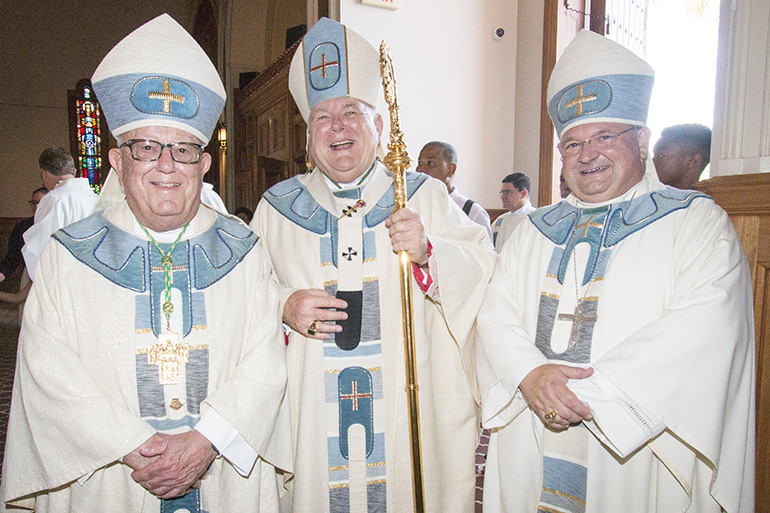
Photographer: ANA RODRIGUEZ-SOTO | FC
Archbishop Thomas Wenski poses with his predecessor, at left, Archbishop Emeritus John C. Favalora, who ordained him a bishop 20 years ago, and Auxiliary Bishop Peter Baldacchino, whom Archbishop Wenski ordained as bishop three years ago.
